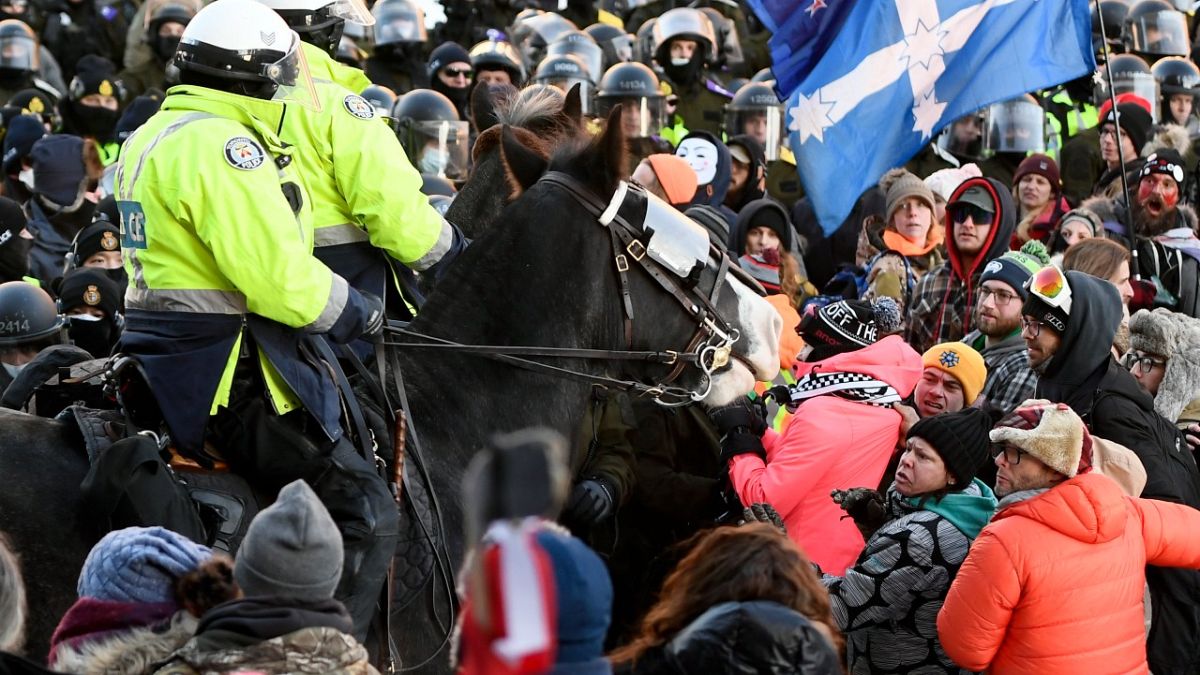The capital and its paralyzed streets represented the movement’s last stronghold after weeks of demonstrations and blockades that shut down border crossings into the United States.
Police arrested scores of demonstrators and towed away vehicles Friday in Canada's besieged capital, and a stream of trucks started leaving under the pressure, raising authorities' hopes for an end to the three-week protest against the country's COVID-19 restrictions.
By evening, at least 100 people had been arrested, mostly on mischief charges, and nearly two dozen vehicles had been towed, including all of those blocking one of the city's major streets, authorities said. One officer had a minor injury, but no protesters were hurt, interim Ottawa Police Chief Steve Bell said.
Police “continue to push forward to take control of our streets,” he said, adding: “We will work day and night until this is completed.”
Those arrested included four protest leaders. One received bail while the others remained jailed.
The crackdown on the self-styled Freedom Convoy began in the morning, when hundreds of police, some in riot gear and some carrying automatic weapons, descended into the protest zone and began leading demonstrators away in handcuffs through the snowy streets as holdout truckers blared their horns.
Tow truck operators — wearing neon-green ski masks, with their companies’ decals taped over on their trucks to conceal their identities — arrived under police escort and started removing the hundreds of big rigs, campers and other vehicles parked shoulder-to-shoulder near Parliament. Police smashed through the door of at least one RV camper before hauling it away.
Scuffles broke out in places, and police repeatedly went nose-to-nose with the protesters and pushed the crowd back amid cries of “Freedom!” and the singing of the national anthem, “O Canada.” Later police on horses were used to push back the crowd for a time.
Police said late in the afternoon that protesters had assaulted officers and tried to take their weapons. Many protesters stood their ground in the face of one of the biggest police enforcement actions in Canada’s history, with officers drawn from around the country.
The capital and its paralyzed streets represented the movement’s last stronghold after weeks of demonstrations and blockades that shut down border crossings into the U.S. and created one of the most serious tests yet for the government.
Authorities had hesitated to move against the protests, in part because of fears of violence. The demonstrations have drawn right-wing extremists and veterans, some of them armed.
Prime Minister Justin Trudeau on Monday invoked Canada’s Emergencies Act. That gave law enforcement extraordinary authority to declare the blockades illegal, tow away trucks, arrest the drivers, suspend their licenses and freeze their bank accounts.
The Freedom Convoy demonstrations initially focused on Canada’s vaccine requirement for truckers entering the country but soon morphed into a broad attack on COVID-19 precautions and Trudeau’s government.
Ottawa residents complained of being harassed and intimidated by the truckers and obtained a court injunction to stop their incessant honking.
Trudeau portrayed the protesters as members of a “fringe” element. Canadians have largely embraced the country’s COVID-19 restrictions, with the vast majority vaccinated, including an estimated 90% of the nation’s truckers. Some of the vaccine and mask mandates imposed by the provinces are already falling away rapidly.
The biggest border blockade, at the Ambassador Bridge between Windsor, Ontario, and Detroit, disrupted the flow of auto parts between the two countries and forced the industry to curtail production. Authorities lifted the siege last weekend after arresting dozens of protesters.
The final border blockade, in Manitoba, across from North Dakota, ended peacefully on Wednesday.
The protests have been cheered on and received donations from conservatives in the U.S.


